N. Ford's Blog, page 6
December 6, 2022
Dig. Foreword
It’s time for something radical.
We’ve collectively experienced quite a lot since the beginning of 2020, and revival is ripe and ready to do what it does.
I have a modest offering toward those ends, but I want to share it with you anyway. As we approach a new year with renewal quivering for its moment to burst, I want to publish a project I’ve been working on for the last several years.
It may make more sense to publish it with a house. It most certainly forfeits financial opportunity by making it all available here. And it may be just plain silly to let it all hang out without professionals raking it for missteps (and I’m sure it has many).
The truth though, is the more I sat with this content, the more I was led to share it.
Over the coming weeks, I will make each chapter of content available to you through this site, starting with the foreword (today!).
No subscriptions, no commitments, no strings attached. If you want to subscribe to the newsletter, please do. If you want to buy The Refuge, yes! If you want to share each chapter with your people, let the chorus shout its hallelujahs.The idea is to bring you life-giving content that will encourage you in the next step of your own sanctification – whatever that may look like.
Let me tell you a little bit about what you’re getting into…
My background is in the health, wellness, and behavior change industry. I have studied and worked in the field for a little over fifteen years and I have been molded by watching and assisting people along their holistic health journeys.
Dig is a book that approaches health, wellness, and behavior change from a whole new perspective. It may be a timely resource in this season when we set New Year’s resolutions and take fresh looks at our habits and lifestyle choices. Each year I set a character goal for myself, and this content has challenged me greatly in the way I approach even that.
I don’t know if it will be helpful for you, but I hope it will be a supporting light to you in your next season, whatever that season may be. To borrow A.W. Tozer’s sentiment, my fire may not be large, but it is yet a fire, and perhaps one of you can light a flame from this one.
So to you, with love.
Nicole

In one of the first conversations I ever had about this project, long before there existed even one word on a page, a pastor I respect very much said this to me:
“Your idea, it’s a good one, but let me prepare you for something…
I can tell them to have patience and be kind to each other.
I can tell them to love their neighbors.
I can tell them not to cheat on their spouses.
I can even tell them what to do with their money.
But if I tell them not to eat those doughnuts, they’ll never come back.”
It is nothing short of a phenomenon that we will accept teaching, guidance, and boundaries in so many areas of our lives, but if a spiritual leader tells us what we can and cannot eat, the seats threaten emptiness. The relationship we have with our bodies is unique, profoundly personal, and unmatched in vitality. It is so much those things in fact, that we allow ourselves to be informed by a spiritual leader in every way but the one way that may be most intimately tied to our holistic selves.
That feels just a little bit backwards, doesn’t it?
Can I put one thing out in the open right away? I don’t have all this figured out. Behavior change is hard. Humans and human habits will always perplex me – including my own.
And with that truth, this one too. There is one thing I know. One thing that has become terribly clear through all of this. Our natural, human bent toward idol worship has a lot more to do with our lifestyle choices than I ever thought possible. I’m not talking about character challenges like patience, forbearance, integrity, humility, etc. I’m talking about our lifestyle choices. What we eat. How often we move. What we choose to do with our daily allotment of time. I think idol worship is more intimately connected to those choices than we ever thought.
“For I do not understand my own actions. For I do not do what I want, but I do the very thing I hate.” Romans 7:15
It’s true in the battle against sin, and it’s true in the fight with our habits, behaviors, and lifestyle choices. It’s true in our addictions, our dishonoring personality traits, our self-concerned natures. And it’s most definitely true in the battle against our own self-wills.
I propose one simple question:
What would happen if instead of trying to conquer food, movement, and other lifestyle choices like our relationship with technology, we instead focus on the battle against our own sinful natures?
We hear it said all the time: our bodies are a gift from God – His temple – and it’s our responsibility to honor that.
“Therefore I urge you brothers and sisters, in view of God’s mercy, to offer your bodies as a living sacrifice, holy and pleasing to God. This is your true and proper worship.” Romans 12:1
If it’s our true and proper worship to present ourselves, our bodies, to God, I have to believe it’s our job to make sure what we’re presenting is at its best… or at least the best we can make it.
Consider this: the facts about how to live healthfully haven’t changed.
For decades scientists and doctors have delivered one singular message for optimal health: eat mindfully and move regularly. Simple. Though executing that very simple direction is not so simple at all.
We are absolutely, unequivocally enslaved to our habits.
What is perhaps most paradoxical about our current health crises is that resources and accessibility to healthful options have never been more present in this country. Nearly all of what’s killing us is highly researched and widely associated to preventable conditions or simple changes in behavior. That means we know exactly how to combat what’s killing us, we have the resources to change the things we need to change, and yet, we are choosing not to change anything at all and dying anyway.
Social media is great example. In the book Anxiety and Disorders: The New Achievements, authors point to the devastating statistics of how the use of technology, namely social media, is affecting us, decimating mental health and sky rocketing suicide rates and yet, our country’s social media usage is higher than it has ever been.
Sugar is another visible challenge. Our bodies are more addicted to sugar than ever in the history of the world. The occurrences of type II diabetes are extraordinary and going widely unattended though in most cases it is preventable, reversible, and manageable.
If the answer to changing all of this was as simple as executing what we already know, this wouldn’t be the foreword of the book, it would be the afterword.
We’ve known the simple solution to our holistic health problems for a very long time now, but it still hasn’t helped. Our health statistics continue to worsen. We face a clinically depressed, suicidal, sugar-addicted, obese, Wall-e reality if we don’t start getting better. And let it be stated that some conditions are not preventable, are highly genetic, and cannot be influenced by typical behavior change. This speaks only for those choices we actively make that perpetually work against us.
The seed that planted this project was a 15-second snippet from the end of a Tim Keller sermon. Dr. Keller said,
“If you want to understand the intellectual trends in your field, see the idols. If you want to understand what’s going wrong in your industry, see the idols.”
In the strike of a match, I saw fifteen years of observations make a lot of sense. There is something terribly wrong in the field of health, wellness, and behavior change, and it’s hidden in a place we’re not seeing because we’re not seeing the idols.
In that same sermon, Dr. Keller points out that Paul approaches all of life differently when he’s seeing the idols around him. He listens to music differently, does his job differently – does life differently – because he’s seeing the idols.
That is the purpose for which this project exists.
Does clearly seeing our idols impact our daily lifestyle choices? And if it does, can we finally start to move the needle on our holistic health by addressing them?
Doing this kind of work might change your ‘why’. It might get really hard. It might be the person in mirror, not the body in the mirror, that gets the makeover.
I propose that the battle against our lifestyle choices actually resides in the battle against our idols.
So, pick up a shovel. It’s time to dig.
The post Dig. Foreword first appeared on The website of N. Ford.
Dig.
It’s time for something radical.
We’ve collectively experienced quite a lot since the beginning of 2020, and revival is ripe and ready to do what it does.
I have a modest offering toward those ends, but I want to share it with you anyway. As we approach a new year with renewal quivering for its moment to burst, I want to publish a project I’ve been working on for the last several years.
It may make more sense to publish it with a house. It most certainly forfeits financial opportunity by making it all available here. And it may be just plain silly to let it all hang out without professionals raking it for missteps (and I’m sure it has many).
The truth though, is the more I sat with this content, the more I was led to share it.
Over the coming weeks, I will make each chapter of content available to you through this site, starting with the Foreword (today!).
No subscriptions, no commitments, no strings attached. If you want to subscribe to the newsletter, please do. If you want to buy The Refuge, yes! If you want to share each chapter with your people, let the chorus shout its hallelujahs.
The idea is to bring you life-giving content that will encourage you in the next step of your own sanctification – whatever that may look like.
Let me tell you a little bit about what you’re getting into…
My background is in the health, wellness, and behavior change industry. I have studied and worked in the field for a little over fifteen years and I have been molded by watching and assisting people along their holistic health journeys.
Dig is a book that approaches health, wellness, and behavior change from a whole new perspective. It may be a timely resource in this season when we set New Year’s resolutions and take fresh looks at our habits and lifestyle choices. Each year I set a character goal for myself, and this content has challenged me greatly in the way I approach even that.
I don’t know if it will be helpful for you, but I hope it will be a supporting light to you in your next season, whatever that season may be. To borrow A.W. Tozer’s sentiment, my fire may not be large, but it is yet a fire, and perhaps one of you can light a flame from this one.
So to you, with love.
Here’s to building those things eternal… N. Ford.

Dig.
Uncovering the Idols that Control Our Choices.
Foreword
In one of the first conversations I ever had about this project, long before there existed even one word on a page, a pastor I respect very much said this to me:
“Your idea, it’s a good one, but let me prepare you for something…
I can tell them to have patience and be kind to each other.
I can tell them to love their neighbors.
I can tell them not to cheat on their spouses.
I can even tell them what to do with their money.
But if I tell them not to eat those doughnuts, they’ll never come back.”
It is nothing short of a phenomenon that we will accept teaching, guidance, and boundaries in so many areas of our lives, but if a spiritual leader tells us what we can and cannot eat, the seats threaten emptiness.
The relationship with have with our bodies is unique, profoundly personal, and unmatched in vitality. It is so much those things, in fact, that we allow ourselves to be informed by a spiritual leader in every way but the one way that may be most intimately tied to our holistic selves.
That feels just a little bit backwards, doesn’t it?
Can I put one thing out in the open right away? I don’t have all this figured out. Behavior change is hard. Humans and human habits will always perplex me – including my own.
And with that truth, this one too: there’s one thing I know. One thing that has become terribly clear through all of this. Our natural, human bent toward sin has a lot more to do with our lifestyle choices than I ever thought possible. I’m not talking about character challenges like patience, forbearance, integrity, humility, etc. I’m talking about our lifestyle choices. What we eat. How often we move. What we choose to do with our daily allotment of time. I think sin is more intimately connected to those choices than we ever thought.
“For I do not understand my own actions. For I do not do what I want, but I do the very thing I hate.”
Romans 7:15
Paul nailed it on the head.
It’s true in the battle against sin, and it’s true in the fight with our habits, behaviors, and lifestyle choices. It’s true in our addictions, our dishonoring personality traits, our self-concerned natures. And it’s most definitely true in the battle against our own self-wills.
I propose one simple question:
What would happen if instead of trying to conquer food, movement, and other lifestyle choices like our relationship with technology, we instead focus on the battle against our own sinful natures?
We hear it said all the time: our bodies are a gift from God – His temple – and it’s our responsibility to honor that.
“Therefore I urge you brothers and sisters, in view of God’s mercy, to offer your bodies as a living sacrifice, holy and pleasing to God. This is your true and proper worship.”
Romans 12:1
If it’s our true and proper worship to present ourselves, our bodies, to God, I have to believe it’s our job to make sure what we’re presenting is at its best… or at least the best we can make it.
Consider this: the facts about how to live healthfully haven’t changed.
For decades scientists and doctors have delivered one singular message for optimal health: eat mindfully and move regularly. Simple. Though executing that very simple direction is not so simple at all.
We are absolutely, unequivocally enslaved to our habits.
What is perhaps most paradoxical about our current health crises is that resources and accessibility to healthful options have never been more present in this country. Nearly all of what’s killing us is highly researched and widely associated to preventable conditions or simple changes in behavior. That means we know exactly how to combat what’s killing us, we have the resources to change the things we need to change, and yet, we are choosing not to change anything at all and dying anyway.
Social media is great example. In the book Anxiety and Disorders: The New Achievements, authors point to the devastating statistics of how the use of technology, namely social media, is affecting us, decimating mental health and sky rocketing suicide rates and yet, our country’s social media usage is higher than it has ever been.
Sugar is another visible challenge. Our bodies are more addicted to sugar than ever in the history of the world. The occurrences of type II diabetes are extraordinary and going widely unattended though in most cases it is preventable, reversible, and manageable.
If the answer to changing all of this was as simple as executing what we already know, this wouldn’t be the foreword of the book, it would be the afterword.
We’ve known the simple solution to our holistic health problems for a very long time now, but it still hasn’t helped. Our health statistics continue to worsen. We face a clinically depressed, suicidal, sugar-addicted, obese, Wall-e reality if we don’t start getting better.
Let it be stated that some conditions are not preventable, are highly genetic, and cannot be influenced by typical behavior change. This speaks only for those choices we actively make that perpetually work against us.
The seed that planted this project was a 15-second snippet from the end of a Tim Keller sermon. Dr. Keller said,
“If you want to understand the intellectual trends in your field, see the idols. If you want to understand what’s going wrong in your industry, see the idols.”
In the strike of a match, I saw fifteen years of observations make a lot of sense. There is something terribly wrong in the field of health, wellness, and behavior change, and it’s hidden in a place we’re not seeing because we’re not seeing the idols.
In that same sermon, Dr. Keller points out that Paul approaches all of life differently when he’s seeing the idols around him. He listens to music differently, does his job differently – does life differently – because he’s seeing the idols.
That is the purpose for which this project exists.
How does seeing idols impact our lifestyle choices? And if it does, can it finally start to move the needle on our holistic health?
Doing this kind of work might change your ‘why’. It might get really hard. And it might be the person in mirror, not the body in the mirror, that gets the makeover.
I propose that the battle against our lifestyle choices actually resides in the battle against our idols.
So, pick up a shovel. It’s time to dig.
The post Dig. first appeared on The website of N. Ford.
October 26, 2022
I Don’t Know Why. But I Know My King.
On Tuesday, September 27th I arrived in Florida in advance of Hurricane Ian.
My full-time job entails hurricane response functions that put Samson and me on a southbound highway, alongside first responders, power trucks, and tree trimmers, driving into a category 4 hurricane instead out of it.
Sound familiar?
That’s because it was the start to my last post.
It’s the start to this one too.
“Why,” you ask? “That’s a story we’ve heard.”
Yeah. I thought so too.
When I left on 9/27, I thought I would be in Florida for two weeks. I thought I was coming to do a week of hurricane response and a week at the beach, at our family’s annual vacation.
That didn’t happen.
Not much of anything that I thought would happen, has happened.
Oswald Chambers asserts that God engineers our every circumstance and if we look with clear eyes, we will see proof of it every day. That is certainly true in this case, but I wonder how many divinely engineered circumstances I’ve complained about when they were exactly what was supposed to happen. I wonder how much growth and refining I’ve missed out on because I couldn’t joyfully accept the twists and turns of unforeseen circumstances.
When I was a kid on family vacation and something would go sideways (e.g., flat tire, getting lost, sold-out entertainment, sick kids, etc.), my dad would happily say, “We’re on the adventure.”
His sentiment is simple but profound. We can choose to embrace the adventure, with all its ups, downs, turns, and flips; or we can stomp our feet, buck up against the things we perceive as undesired, and complain about it all the way home.
Earlier this week, I was thrilled to be returning to what has been my church home for the last seven years. It’s a place I had a hard time leaving when I moved to Tennessee.
Renaut van der Riet founded Mosaic Church and teaches there on a regular basis. He’s an incredibly gifted teacher, and one I was pleased to get hear in person again. You can catch him on the Mosaic Church podcast or website but be warned – you will not depart the same human.
I’ll spare you the full synopsis of this week’s teaching because you’d be better served simply listening to the recording, but Renaut painted a word-picture that – at a minimum – must be shared. Several times over.
He was talking about our differently assigned stations in life – one not superior to the other, but undeniably different. He discussed our responsibility to stand in our separate callings in a way worthy of them, without complaining about them, without continually reaching for something ‘bigger’, ‘better’, or somehow superior to the one in which we’ve been placed – the one for which we were created.
I think here in the west we’ve become a little confused about why we were put here. We’ve been taught to pursue individualistic excellence. To get or portray a life other people will want. To be the best, consume the best, create and indulge in whatever makes us feel the happiest from moment to moment.
I’m not saying we shouldn’t pursue our dreams – I think our dreams are often placed inside us by our Creator, on purpose – but I think we’ve lost sight of our first and singular purpose, which is to glorify our King in our every moment, in whatever station He’s assigned us, no matter how far from our desires that happens to seem.
Renaut painted a word picture that helps demonstrate faithfulness in this space.
He said he pictures himself in a kingdom in which a king has asked him to strip naked and walk in circles around the kingdom, singing.
And he does it. Because the king asked him to do it.
Are you having the same first reaction I did? Are you sitting there thinking, “Why?”. Why would a king ask something like that? And more so, why would someone obey that order without finding out the purpose of it? Why didn’t he get a reason, an explanation, a full synopsis of the strategy from start to finish so he could at least begin to understand why he was being asked to do something so outrageous? Maybe if he got the reason for why he was being asked to do it, it would be easier to understand his actions.
Our culture has taught us not to just ask, but to demand an explanation for every one of our options. It has become our instinct and our presumed right to consume every detail, ascertain our best choice for our best life, for our best moment, every moment.
But I don’t think that’s the nature of the kingdom. I’ve read that great book several times, but I haven’t yet found in it a promise for explanations. I haven’t found words that say I’ll be given clear reasons for my every circumstance so that I have the leisure of understanding when things go awry.
If you’ve been around children at all you know our human nature is to ask.
“Put your dishes in the sink.”
“WHY?”
“It’s time for bed.”
“WHY?”
“You need to say you’re sorry.”
“WHY?”
All I can say is if we know how to do this when we’re three years old, it’s a foundational part of our fallen humanity.
At the end of Renaut’s word picture about walking naked and singing around the gates of the kingdom, he says he pictures someone running up to him and saying, “Hey man, why are you doing this?! This is crazy!”
Renaut answers, “I’m doing it because the king asked me to do it.”
The person looks at Renaut like he’s completely lost his mind and he shouts the very question we’re all thinking, “Why would you obey an order like that?!”
Renaut’s answer this time is simple, profound, and paramount to how we must proceed.
“I don’t know why,” he says, “but I know my King.”
We are not offered explanation. We are not promised understanding. But what we are promised is that He is faithful. He is sovereign. And that He engineers our every circumstance for His glory.
When I came to Florida on September 27th, I thought I would be here for two weeks.
In the nearly five weeks it’s been since then, I have bounced from place to place, slept on couches, slept outside, slept on beds that don’t smell like me, and taken my dog and my bags in and out of my car more times than I’d like to figure. I’ve sat at old familiar coffee shops, had conversations with strangers that lasted for hours, and passed countless hours with friends I thought I’d said a final goodbye to when I moved out of state several months ago. I sang at an impromptu wedding for a dear friend. I sat with another friend while the concrete below us darkened from her tears. I prayed over a new couple. I got to see a friend I never would have seen if I wouldn’t have been in this state, on these days, at this time. I will see someone who I thought said his final goodbye to me a year and a half ago. I got to hug a mom who watched her daughter try to end her own life the day previous. And I got answers to questions I’ve been asking for years. They are not the answers I thought I wanted. But they are the answers that were given, and I refuse to demand an explanation for them.
Through this unpredicted set of circumstances, I will remain in Florida for nearly eight weeks before driving north again.
It’s been a lot of laundry.
And I continue to be surprised. Every day there’s something else that happens that blows my mind. Another purpose. Another reason. Another conversation. Another interaction that beautifully displays ultimate sovereignty over the tiniest of details.
I don’t know why; but I’ve seen too clearly to demand any more of an answer than I’ve already been gifted. Too many miracles. Too many amazements. Too many astounding ways circumstances have been so engineered that I can no longer be bold enough to raise even a whispered ‘why’ skyward.
We are not our own. And I need help with surrender to that every day.
But perhaps in this season, we can together smile at the people who run up to us while we march naked and singing around the kingdom and say:
“I don’t know why. But I know my King.”
[image error] [image error]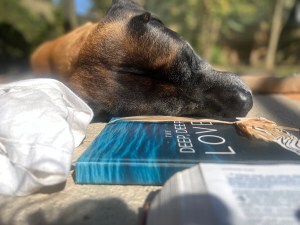
The post I Don’t Know Why. But I Know My King. first appeared on The website of N. Ford.
October 5, 2022
The Furthest Two Inches
On Tuesday, September 27th I arrived in Florida in advance of Hurricane Ian.
My full-time job entails hurricane response functions that put Samson and me on a southbound highway, alongside first responders, power trucks, and tree trimmers, driving into a category 4 hurricane instead out of it.
It’s a pecking feeling to purposefully leave sunny skies for stormy ones.
After gas stations, highway food, and a less-than-entertaining audio book, I landed on a colleague’s floor, sharing an air mattress with my 150-pound ride-or-die.
He’s hairy, gassy, and he snores like a freight train; but good grief I love that dog.
People keep telling me he’s training me for marriage. That’s a terrifying thought.
What my gracious colleague and I were unaware of was the fact that the air mattress upon which I rested had the tiniest, most invisible, silent leak in it.
You’ve been there, haven’t you?
Between the weight of my body and a 150-pound animal moving on and off the mattress through the night, the air leaked faster and faster, and I got closer and closer to the floor. And around 12 a.m. the rise and fall of the mattress in response to Samson’s movements no longer held me off the hardwood. If Samson was on the mattress, I was resting on air. If Samson left the mattress, I hit the floor. It got to the point where if he was on the mattress, I knew he was going to leave again and when he did, I would fall the furthest two inches of my life – two angry inches down to the hardwood that awaited my tired bones.
Those two inches mocked me all night.
In my half-asleep state I wanted to coach Samson away from leaving, telling him to stay, but I couldn’t muster the energy. I could have moved myself to the living room couch. I could have turned on the light and found the leak and fixed it.
But I didn’t.
I chose to stay inside the torture cycle instead of doing something about it.
Instead, I braced myself, knowing the fall was coming. Knowing the hardness would hit me again and cause me to wake. It would steal my sleep until Samson came back to float me back up those mocking two inches and then torture me with his inevitable departure yet again.
My knowledge of this impetuous cycle owned the night. I did not rest. I did not succeed. I did not thrive.
If only I would have chosen to get up, find the leak and fix it. If only I would have found somewhere else to sleep. Or simply removed the mattress so the cycle would end. It would have been uncomfortable to remain on the hardwood floor, but at least I would have ended the torture cycle. I had so many choices. So many alternatives to staying where I was, but I did nothing.
I’ve been told many times that the hardest thing to do is usually the right thing to do.
It is the shortest distance from where you are to where you need to be, but it’s the hardest thing to consider. It’s the furthest two inches.
The consequences are too great. The divide too big. The choice, too controversial. Too many changes will happen. Too many upsets. Too many discomforts.
And so, we don’t. We don’t end the relationship we know we should. We don’t quit the job we know is stealing from our family. We don’t decline the opportunity we know is going to compromise our ethics. We don’t make the commitment that will limit our freedom. We don’t look that person in the eyes and apologize. We don’t make the call we should have made seven years ago.
We don’t choose hard.
Oswald Chambers calls it ‘doing the thing that lies the nearest’. This is the thing you and everyone you love knows is the right choice for you. It’s the thing that is likely not glamorous. It’s not sexy. It’s not the choice that will garner applause or cause ‘likes’ to stack up.
But it’s usually the most obvious choice. It’s the choice that comes to mind first. It’s the one you push out of your mind the fastest because you’re too afraid or too tired or too weary or too discouraged to face the fact that it’s the right one.
Can I be honest with you?
I don’t want you to be happy.
Streams in the Desert offers a visual that will help me explain:
You need to cross the ocean via ship. Two options for passage are available on two identical ships. The only difference is your choice of captain.
One ship offers a man in sailor’s uniform. He’s smiling brightly, with shiny white teeth and a twinkle in his eye. His broad shoulders and muscular build tell you of a man fit for duty. He stands with confidence and leans ever-so-casually against the gangway.
The other ship offers a man decades older than the first. Wrinkled, sun-drenched skin paints his face below whited hair. His eyes droop from above and a near-gone cigar stays ever-fixed to the corner of a scarred mouth. He doesn’t make eye contact with you. He’s running his hands over a rope tie fixed to the port side of the ship, too concentrated to notice your presence.
The difference between the captains is captured in one word: experience. And with experience, with living, comes inevitable trial, failure, mistake, and growth.
The sun-drenched sailor has journeyed through violent storms, uneven seas, and injuries to the ship. He’s seen the worst of it, and he’s seen the best of it.
Not only would I rather sail with that captain, but I would also rather be that captain. I want to know how to pass through rough weather. I want to be able to sail through a hurricane. I want to be able to get up in middle of the night, find the leak, and fix it.
But the inconvenient truth here is that one cannot learn how to sail treacherous seas without actually sailing treacherous seas.
We can’t both want the experience and deny the work.
So, said with the greatest love I have… I don’t want you to be happy. And I don’t want me to be happy either.
I want us to live enough to fail and make enough mistakes to find a new way. Even if it comes with pain (and it will), I want us to grow. I hope we are challenged and that we actively seek the discomfort that will morph us into the next, newest, better version of ourselves. I want us to be able to step onto our ships with the knowledge that there may be days when we are tossed to and fro like a rag doll, but we’ll know what to do. We won’t be rocked by emotion. We won’t be devastated by the waves that come because we’ll know how to manage them because we will have done it before. We will have built the tools not only to survive, but to ride the violence like surfers, with skill and precision, and most importantly – with joy (James 1).
So let me amend it: I don’t want you to just be happy. I want the absolute, undeniable, wearying, gritty, productive, profitable, best for you. Even if it comes with the tired smile of a well-travelled captain and the furious choice to drag the air mattress outside, soak it with gasoline, and light the bastard on fire.
It may be the shortest distance between where we are and what we have to do, but those are the two most productive inches of our lives.
Those are not the easy choices. They’re the hard ones. But they are the choices that will take us one step closer to being the captains we want to be. The captains people choose to sail with, because they have confidence in our abilities to do hard things.
We are looking at the shortest distance to the greatest production. And I want in.
If you’re willing, share in the comments your ‘furthest two inches’ choice that broke (or will break) the torture cycle.
May we encourage each other – for a season – to push aside our burning needs to be happy and instead choose to journey into the best, regardless of the storms that may come with it.
The post The Furthest Two Inches first appeared on The website of N. Ford.
September 23, 2022
Destination NOW
A close family friend passed away unexpectedly this week.
When I say, “a close friend of the family”, I mean someone who’s next of kin, is us – our tribe. The kind of family friend who comes to every family celebration and more – 4th of July, Easter, Thanksgiving, Memorial Day, Labor Day, Christmas morning, family members’ birthdays, my own surprise party. The kind of close family friend we save a seat for at church every Sunday. The kind of family friend that when we say we make up a tribe of 19 people, he’s included in that count.
He makes 18, 19.
His death was completely unexpected. So much so that nearly all of us have said in reflection, “He was just here. I was just talking to him. He was right here at this table.” Personally, I had to ask several times for confirmation of the news. “Are you sure?” “Did someone confirm it?” “Did the EMTs really check?” “Are we sure?”
It was that kind of unexpected.
When unexpected death happens, it’s natural to think about what this all means. Why we’re here, what we’re doing, how we’re spending our time. Does it matter? Is it worthwhile? What kind of legacy do I leave behind?
The truth is, that one second we’re here, and the next we’re not; and no one knows when the clock is going to run out. All of the sudden your mail is piling up outside an unkept mailbox. The food in your fridge is spoiling. The TV perpetually spews its news to an empty room because no one thinks to click it off before they die.
Those followers haven’t achieved anything for you.
Those likes didn’t fill your soul.
The division over that issue remains.
That relationship is still unrepaired.
That apology is unsaid.
That sentiment you felt (be it love, betrayal, hurt, gratitude, appreciation, forgiveness), that you thought about sharing with her, or with him, or with them – it’s going to live forever without a voice.
There’s a lot to reflect on with death.
It’s natural, it’s unavoidable, and it’s coming for all of us.
I’ve thought a lot about the concept of legacy this week, and as only God would have it, I’ve been reading Donald Miller’s newest release Hero on a Mission. Although I’ve appreciated all his books, this one reflects his evolution over the years, not only as a writer, but as a human (if I may say so from a meek reader’s perspective).
Donald Miller is a tremendous storyteller, and this book is no detour from that fact, but in this one, readers are taken on a much grander journey than a hike up a mountain or a bike ride across the country. This book leads readers into the recesses of their own souls – much greater terrain! – and asks them to look inward, identify how they’re living, invites them to choose something (anything) meaningful to pursue, and offers practical steps for how to be doing it every day. In this book Donald Miller invites you to write your own eulogy and use it as a narrative guide for how your daily choices will be informed.
I don’t think it’s mine to guess what our close family friend intended his legacy to be. I can offer my own perception into his legacy, but only he could create or state his mission. What is mine; however, is to make my own legacy crystal clear. Not just to me, but to everyone with whom I interact.
And yours is there for you to do the same.
The mass of practical resources offered to help you identify and pursue your legacy are inside Donald Miller’s book, Hero on a Mission. What will become very clear to you in consuming this information is that legacy is not something that is created the day you depart from this world.
It’s created every day you live leading up to your departure.
Recently someone I know had to make a really hard choice at work. It was a decision of whether or not to leave the current company for a different one, and after a lot of consideration, prayer, and mentoring, a choice was made.
The choice was for the less lucrative option. It was for more family time, a better work-life balance, more holistic health, and what felt like the leading from the Spirit.
It was not the logical decision. It was not the decision that would springboard a career into something greater. It was not the decision most people would have made.
And you know what? Things got hard.
Dynamics are harder. Finances are harder. Work relationships are harder. Day-to-day life in the job is harder.
Have you experienced this? You pray and toil over a decision and you make the sacrifice and do the hard thing, and when you do, it feels like things get exponentially more difficult. You start to question your leading, your understanding, you start to question your ability to discern. Did I make the right choice? What’s going to happen now? Did I miss a huge opportunity? Did I make a choice that will cause my family to suffer?
When I was discussing the situation with this person, we came upon something profound.
We already know our destination. The conclusion has already been finalized. The victor has already been chosen. The movie has already ended.
The guy got the girl.
Rocky won the fight.
The treasure was won.
The people were saved.
The Death Star was destroyed.
We already know how this all finishes and yet we live yearning for the next big thing. That raise that will make things better. That move to where I really want to live. That marriage to the person who makes me feel like somebody. That child to be conceived. That big promotion. That dream job. That dream car. That dream house.
We live perpetually for the almost but not yet and while we do, we miss our legacy.
Consider this.
If our destination is already concluded, the destination can no longer be the point.
The point then, can only be found in how we live each day… the journey. The now. This is the one thing we may still impact.
The picture of Rocky holding up the trophy doesn’t mean anything without knowing how he got there.
The kiss at the end of the movie doesn’t give you the feelings it does if you don’t know how the couple fought to be together.
The treasure being won or lost doesn’t matter without knowing who was finding it, why, and what obstacles they faced getting there.
The destination simply does not carry profundity without the journey.
And our journeys are happening NOW.
When Paul is writing from prison and says he has learned ‘to be content in every circumstance’, I don’t think he means he’s learned to smile at the pain. I think it means he’s figured out that his destination is NOW. I think it means he’s figured out that every second, right now, informs his legacy – regardless of his circumstances. He writes, “I know what it is to be in need, and I know what it is to have plenty. I have learned the secret of being content in any and every situation, whether well fed or hungry, whether living in plenty, or in want.” (Phil. 4:12)
This is not a “Hey man, I can be happy when things suck, good for me.”
This is a “This right NOW, regardless of what it feels like, this is the purpose of my life. How I respond to this; how I rejoice in this; how I use every moment for the glory of God, no matter if I’m shipwrecked, or in prison, or bitten by a snake, or beaten” (and yes, he was all of those things!).
Whether you or I get that job, or that raise, or get married (still waiting on that, thanks), or get to have children (still waiting on that one too), or get that car, or that house, or get that award, or that honor – our conclusion is already set.
These almosts but not yets are not why we are here. They will not inform our legacies.
Can I ask you something? How many funerals have you attended in which someone talks about how many cars the deceased had? Has anyone ever mentioned the departed’s recent promotion or raise? I wonder if anyone has been praised at their funeral for their great social posts, or their influencer status.
I wonder what would change if we chose to let go of our ‘not yets’ and make a deliberate action to define, pursue, or articulate our legacies. How would that change our actions from moment to moment? How would it change how we experience hardship or discontent?
If I die tomorrow, I don’t want people to say of me, “That person wanted to be married.” That’s not a legacy. It’s a wish unfulfilled.
I have only just arrived upon my assignment to write my own eulogy, but I’m committing to it this week. That’s the practical step I’m taking this week toward building a legacy.
And Donald, I’m gonna give it all I got. And one day soon, I hope we sit at Goose Hill with my family beside me and your family beside you, and share our missions. Missions that have have action plans. And I hope we dream up all the new ways our missions can evolve to be even greater; missions that will serve even more people, add more beauty to the world, or aid even greater reconciliation.
Because we already know Rocky wins. Now’s our chance to write the good part.
“For whatever is true, whatever is noble, whatever is right, whatever is pure, whatever is lovely, whatever is admirable – if anything is excellent or praiseworthy – think about these things.” (Phil 4:8)
The post Destination NOW first appeared on The website of N. Ford.
September 10, 2022
Koinonia
Koinonia. Phonetically, it sounds like coin-on-ee-a. It’s derived from the Greek language and finds its meaning within the shared roots of participation, partnership, fellowship, community, and association.
When I was ruminating on what to call this blog, I kept coming back to the idea that I wanted it to be a place where we reside together. Where there is no need for an invite list because it isn’t exclusive. A place where you can bring brokenness, or questions, doubts, or your unique experiences and opinions, because our differences enhance us (at least they can if we let them). I want it to be a place where if you’re alive, you’re welcome – just like Zoar (if you don’t know Zoar, read The Refuge, Book One of the Refuge Trilogy).
In facilitation there’s a common phrase used to highlight the power of different people and their unique experiences. They call it ‘using the power of the group’. This idea invites the facilitator (this is the person leading the conversation) to step back, be silent, and ask the group to offer their perspectives to teach the collective because together, the group will always be smarter, more experienced, more well read, and more educated than the facilitator alone. This amalgamation of people and experience working toward mutual edification – that’s an active expression of koinonia.
But koinonia is a lot more than that too, and I think God had a much fuller intent behind using koinonia to name this blog than I could, or can, understand from my very limited perspective. Koinonia is more than mutual edification. It’s more than association. And it’s more than being on the invite list.
There’s something that continually happens in the New Testament that preempts miracles, and I think it’s essential to the holistic understanding of the word koinonia. Right before Jesus or one of the disciples performs a miracle, there is an action required of the recipient – there’s a critical partnership to the miracle.
“Pick up your mat and walk.” (John 5:8) – This He said to the lame.
“Fill the jars with water.” (John 2:7) – This He said at the wedding, before turning water to wine.
“Bring me the bread and the fish.” (Matthew 14:18) – This He said before feeding 5000 people with 2 fish and some bread.
“Young man, I tell you, GET UP.” (Luke 7:14) – This He said before raising a child from the dead.
There is a clear and continual command to participate, to act, to partner in it. This is not a ‘come and be served’ kind of community. Koinonia is a come and be served, and serve, kind of community. A partnership. A participation of all the parties.
It seems we tend to fall on one side of this line and hang out there. We tend to be consumers, or we tend to be servers. I wonder how the idea of koinonia can challenge us to evolve in this space.
When I was young, we went on mission trips to Jamaica to work with orphanages. Before we left, I remember someone telling me to make sure we graciously accepted acts of service from those we were going to serve. If they wanted to feed us, welcome it. It they wanted to clothe us, graciously accept. It they wanted to give us gifts, celebrate it. As a young person from the west, this was hard to consider. We were going into the third world, and I wanted to give all I had to serve the people there. It was made clear to me though, that there is a dignity to be offered when serving.
We don’t need to be heroes. We need to be humans.
And to be human is to serve, and to be served – both. To give graciously and to graciously accept. To have seasons where we pour out and seasons where we need to receive care.
I was reflecting this week on examples of koinonia in my life and I want to share a few with you.
This is Cortlan.
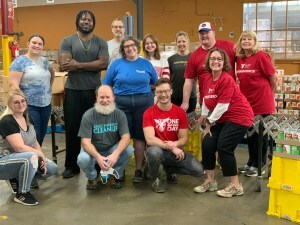
If you read The Refuge, you’ll recognize his name from the acknowledgements. Cortlan has been a dear friend of mine for over two decades. There are several things I could list about Cortlan that I love, but the thing I admire most is the way he participates in koinonia. Cortlan is not just part of community, he creates community. He serves community. He brings community together. Everything Cortlan works toward is about laying the pavement so someone else can launch into something greater. He created a sweatshirt that says, “Normalize Success” because he wants everyone, regardless of station, to have access to the very best for themselves and their families. These are just two photos of Cortlan engaging in service for his community, with his community.
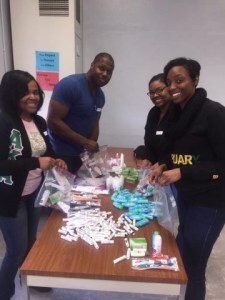
Cortlan highlights well the partnership, participation, and togetherness that make up the heart of koinonia.
This is Mark and Karen.
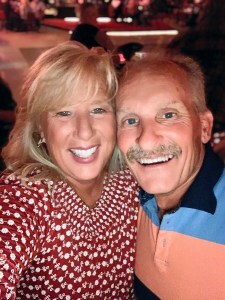
I met Mark and Karen through a small group community at Mosaic. They have four grown girls and two sweet dogs and live in a beautiful house by the lake. They are what you would call ‘lake life people’ in the absolute best sense of the term. Mark and Karen are dressed in smiles and have hearts that are set on listening, welcoming, and empathizing. They both do this supremely well for anyone they happen across and because of it, they find themselves the heart of several koinonia spaces. Recently Mark and Karen needed a dog/house sitter, and I needed a place to stay with Samson. We swapped efforts. I was able to offer them a dog/house sit, and they were able to offer me a beautiful and life-giving place to lay my head. I kept looking around their home, which is so deliberately set up for hosting community, and thinking that they have created a life toward and for koinonia. Our trade of efforts was just one, small, beautiful expression of that, and it was possible because they have been intentional. We were able to serve each other in mutual benevolence, both very happy to help the other, both participating, both giving, both receiving. This is just a small example of how Mark and Karen live in koinonia, but it’s an adept picture of their greater existence. They live for, and in, and toward koinonia.
This is Clint.
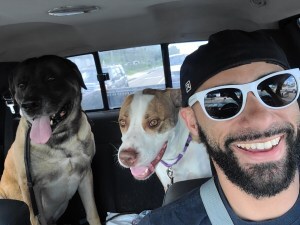
I really like Clint. He doesn’t have a pretend face, and I think that’s a rare gift in this world. With Clint, what you see is truly what you get. He’s not afraid to be vocally thankful or afraid or vulnerable and I think that is the stuff that makes community authentic – it makes it really mean something. When I’m on the road, Clint is one of the first people to say, “This is your home, our door is open.” When Clint and his wife moved into a brand-new home, they let me move all of my earthly possessions into their house where they sat in a pile on the ground for a month while I got my act together. Clint has watched my dog, bought me dinner, cried with me, loaned me his truck, and has been a primary driver of wanting to celebrate some of my big life things like launching a book, finishing grad school, signing contracts, and having birthdays. Clint does koinonia well without even knowing what koinonia is (and that sentence just made him laugh). It should be noted that Clint’s wife is one of my besties and an entire book could be written on her koinonia, so her stories are being saved for a later date. Today, I want to shine a light on Clint, who unknowingly slays at the concept of koinonia because it’s just who he is.
This is Gina (in the middle).
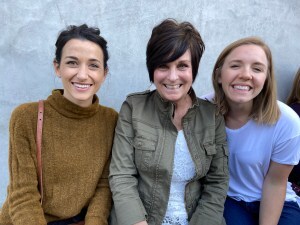
I met Gina at a service day where she and I both showed up to roll up our sleeves and do some work while we tried to build some community at the same time. Since then, I have watched Gina create koinonia by asking people to coffee, asking people to try new hobbies, and introducing people who have commonalities. Gina regularly invites people to concerts, dinners, joins studies, small groups, and serves her community in several ways. She reaches out to encourage people, she calls and connects with people, and she leads people in prayer at the turn of a breath. Gina has not had an easy road and because of that, she has a lot to offer. Instead of letting hardship hinder her, she has decided it is her best tool to serve other people. Gina is a brilliant example of someone who mindfully creates koinonia everywhere she goes, and it is a beautiful thing to watch; and it’s a beautiful gift to receive.
When I looked around at my world, these examples of people bringing koinonia to life came to my mind almost instantaneously. They are living in and creating koinonia in beautiful and authentic ways every day and I want to learn from each of them. I also want to invite you – not only to be a part of this koinonia, The Blog Koinonia, but to create and step into koinonia wherever you are, in whatever way feels most appropriate for you. (Note that I didn’t write ‘whatever feels most comfortable for you’. Engaging in koinonia may not always be cozy, and I think if it feels a little uncomfortable, that means we’re probably doing something right.).
I’m a far cry from having koinonia figured out, but my hope is that through this space, The Blog Koinonia, that you feel welcome. I hope you learn something, somehow, someway – and I hope to learn from you. I hope we grow together, refine together, and celebrate together. I don’t think koinonia is meant to be a utopia, but the journey will not be as great, or as vibrant, or as dynamic, or as special, or as meaningful – without you in it.
If you’re in, drop a note below about your favorite examples of koinonia in your life. I would love to celebrate them with you.
The post Koinonia first appeared on The website of N. Ford.
September 2, 2022
Spoiler-Free Character Dives: Mae
I’m off the road and back in Tennessee after a month of work, seeing great friends in Florida and Indiana, kayaking out of a surprise thunderstorm (@erica), 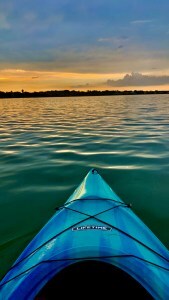
book signings, having a claustrophobic panic attack in the middle of my graduate school commencement, taking Samson on his-first ever boat ride (for result, see pic at the end),
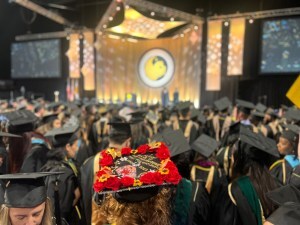
meeting my newest favorite tiny human (@paige), and laughing about misheard song lyrics (hear Chris Stapleton’s ‘Parachute’ and then hear one of my friends (@alie) sing at the top of her lungs ‘baby, I will be your… pair of shoes’?!). For the record, I will never be able to hear that song again without laughing through it and (said with love) I hope we’ve ‘ruined’ it for you too.
 Photo credit: Brianna Foster, IG @brifosterphotog
Photo credit: Brianna Foster, IG @brifosterphotog
That string of adventures and challenges had me earning my sleep every night, falling into bed with heavy limbs, and held with it endless and unforgiving reminders that I’m not 17 anymore. So, as much fun as it was, I gleefully find myself returned to the mountains, surrounded by my tribe, and elbow-deep in writing Refuge Red, Book Two of the Refuge Trilogy.
A few days ago, a fellow author wrote and asked me if I like the process of writing. Well, I don’t like it. And by that I mean, I don’t just like it. I count down the minutes of the work day so I can finally get to pop open ‘the other’ computer and get back to the story, or back to the blog, or back to one of the other projects on the dreamwork list.
It’s a special thing, I think, to love something like that. I think that’s what it feels like to know you’re doing what God made you to do. And I don’t dread it. And I don’t just like it, either. Saying “I love it” here smells like a strong kind of cheesy so I’m just going to leave it there:
I don’t just like writing.
Getting back into Refuge Red though, has me taking a deeper look at the characters who make up the cast. In the books to come – those outside the trilogy – readers will more often hear from only one or two voices, so I love that in The Refuge Trilogy, readers interact with a vast and varied cast of 8 – 12 distinct voices.
I can’t come near picking a favorite, because they are so unique in experience, age, background, and personality – as are we all. As such, it may be a well-spent detour to take a break from the blog voice and use a post every-so-often to deep dive our favorite personalities of The Refuge.
So, now that we’re good and warmed up, let’s spend some time with Mae.
SPOILER-FREE CHARACTER DIVES: MAE
I didn’t realize it at the time, but I wrote a lot of my mom into Mae’s character profile.
Maybe it’s because Mae is the primary maternal figure in The Refuge Trilogy, and it’s natural to write the mom you have… but I don’t think that’s the reason. At least not entirely.
Mae is foundational to the storyline. By this I mean the entire world of Physis is impacted by Mae’s choices. Mae doesn’t need a spotlight. She is light producing on her own – without the flood lights, without the audience. She doesn’t need it. She knows who she is, she knows why she exists, and she’s pursuing it with her every energy, regardless of the opinion of the culture that surrounds her. She experiences overwhelming hardship, excruciating loss, and unforgiving circumstances and yet – she leads her community with ears that listen and with a heart full of grace. She pours herself out and into the people that make up her community, regardless of their histories, their mistakes, or their current states.
My favorite thing about Mae is that she refuses to feel sorry for herself. She will not let self-pity win. She’s been elbow deep in crisis throughout her life, but it doesn’t drown her, it drives her.
What is it about Mae that allows her to accept the circumstances of her life and consistently move into the chaos with calm? And can we do that more often?
Mae is wholly unafraid of darkness. She is physically the most vulnerable of them all, powdered with age and tiny in framing but simultaneously the most courageous, the most willing to address hardship, all the while coaching the rest of the cast to the do the same.
World, you just met my mom.
It’s natural, I think, to write the people around us into our characters. I read somewhere that as authors there are parts of us, and parts of the people that make up our communities, in every character we write. As I consider the various personalities that make up the cast of The Refuge Trilogy, I can’t help but observe and agree with that statement. And, if they allow me, along the way I’ll introduce you to each of the influences that impacted The Refuge cast as we journey.
Mae’s influence was easy to identify. It is particularly familiar and a carefully accurate portrayal of part of what makes up my own foundation – my mom. And no, she’s not comfortable with all these words about her, but she loves me, so she’ll allow it. (Won’t you, mama.)
Mae in One Word
In one word, Mae is immoveable. She is as sure as iron. It’s what I admire about her, and what I want to be more like.
I’d love to hear your thoughts on Mae. What makes her so steadfast? What’s your one word to describe her? And most importantly, what can we learn from her? I’d also love to hear your favorite misheard song lyrics because that’s a gift that just keeps on giving.
One last thing: here’s that picture of Samson I promised. It took a solid five minutes to talk him into getting into the boat, which may or may not have ended with me physically shoving him in, but he did it. And he loved it.
(He gives me the side eye every time we near a dock now, though.).
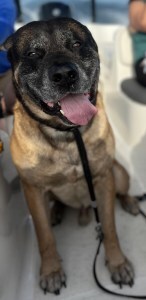
The post Spoiler-Free Character Dives: Mae first appeared on The website of N. Ford.
August 25, 2022
You’re Going to Fail: The Choice Not to Use Social Media
A couple of weeks ago I sat in a one-on-one coaching session at a writers’ conference.
This is how the session began:
Coach/mentor: Hello, N. Ford, how can I help?
N. Ford: I know how effective social media can be for spreading the word about my novel, but it’s not the right choice for me right now. Can you offer coaching on how to best use my author website? I’m sure I can use it more effectively.
Coach/mentor: You’re not using social media?
N. Ford: No.
Coach/mentor: You need to start right away.
N. Ford: I understand its benefits and its efficacious marketing nature, but it’s not the right tool for me right now. Can you help me use my author website more effectively?
Coach/mentor: No.
N. Ford: No?
Coach/mentor: No. If you won’t use social media, you’re going to fail, and I can’t work with you.
The session continued for another forty minutes and included the coach/mentor deep diving his own social media and showing me how it has worked for him. I reminded him that I was hoping for coaching on how better to use my author website, but he couldn’t see past my choice. To him, opting out of social media equals failure, and it was his job to talk me out of it.
I think we both left discouraged.
He, shaking his head in disbelief and frustration that I wouldn’t see reason.
Me, feeling unseen and unheard.
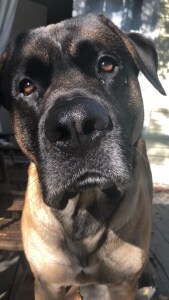
There’s a lot about this interaction that I could dissect for learning, but I want to talk specifically about social media.
There’s no questioning its efficacy. It is, undoubtedly, a tremendous tool for marketing and communication. Its reach is beyond anything I can achieve in person or by word of mouth. But in my context, that’s not the point. I don’t share this as an indictment on anyone who uses social media. I’m glad if it works for you. My choice not to use it speaks for me; not for you.
The truth is that I cannot use social media without comparing.
I can’t help but get the happy juices when people respond positively to my posts.
I can’t help but feel blue when they don’t.
I can’t help but glean a little validation from the ghosts behind the wall and when they’re absent, I notice.
I cannot separate social media from self-promotion.
Moreover, I don’t want to live life trying to capture every post-worthy moment for someone else’s affirmation. I don’t want to seek validation from people I rarely, if ever, see in real life – or those whom I’ve never even met. I don’t want to look at other people’s posts and fight the thoughts that they might be living a more interesting life than me.
It’s been over six years since I’ve interacted with social media and they’ve been the freest, most joy-filled years I have ever known.
I know that a social media platform means influence. I know it means followers. I know a social media platform means sales. I know a social media platform is what publishers look for to qualify whether an author is worth investing in or not. I know it means a big reach and a lot higher potential for a lot bigger pay day.
But from the beginning of this journey, I have felt convicted over the importance of this phrase: Soli Deo Gloria. Literally translated it means ‘glory to God alone’.
This journey isn’t about me.
It’s not about sales. It’s not about how big I can build a following or how many people I can get to like a post. God gave me a story to write and I wrote it. And He’s sold books for hundreds of years without the help of social media.
If you use social media, I’m glad for you. It likely means you and I are built very differently. If you think The Refuge is something worth spreading and you want to help – use your platform to help spread the word. But please only do so if you want to, if you feel moved to, and if you feel like it’s something worth sharing.
If you’re reading this and realizing that social media hurts you – your social, mental, emotional, or spiritual health, I invite you to set yourself free of it.
It is one of the healthiest decisions I’ve ever made, and I’ve never regretted it.
So, for now, my choice will not be swayed. It’s the right thing for me to not use it – and maybe it’s the right decision for you too. And if you’re reading this and thinking this may be a good new word for you, can I be the first to tell you…
You don’t have to use it.
Social media does not validate you. It doesn’t qualify you. The ghosts behind the wall cannot give or take away your value. The pressure you feel to perform against other social posters; measure up to arbitrary levels of ‘success’ or ‘popularity’; or somehow portray a life more interesting than your neighbor’s is not at all a part of the abundant life God promised for you. If it’s you who needs to be set free, let this be your invitation; your permission; your freedom bell.
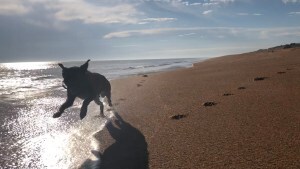
Whether I sell one book, or one million, I want to do it in a way that honors the call that was placed on my heart – Soli Deo Gloria. And today, that means doing something so countercultural and so outrageous that I get to be told I will fail, and that people won’t work with me.
Well then, this one goes out to the losers. Y’all got room for one more?
The post You’re Going to Fail: The Choice Not to Use Social Media first appeared on The website of N. Ford.
FIRST FRIDAY EUSTIS
First Friday – Historic Downtown Eustis
Author Book Signing at Lemonade Lifestyle Boutique
113 N. Bay St.
Eustis, FL 32726
Friday, October 7, 2022
6:00 PM – 9:00 PM
The post FIRST FRIDAY EUSTIS first appeared on The website of N. Ford.
August 19, 2022
CHILD, DO YOU THINK THIS IS ALL I HAVE FOR YOU?
In August of 2020 most of my family gathered to celebrate my nephew’s fourth birthday. It was five months into the Covid-19 pandemic.
We sat around a living room after the kids had gone to bed, listening to them pretend like they were asleep. A few adults sat across two couches that faced each other; a few sat on the floor. One sat on a silent and cold brick fireplace with a cup of coffee in hand. Well-worn life patterns of alarms, workouts, coffee, and a kiss in the doorway were replaced with 50-yard stares, exorbitant amounts of time in front of virtual meeting cameras, and backyard meals with the only faces one was permitted to see.
Nothing was a foregone conclusion. Every day brought a new wave of tragic news and we, along with many, many others started to reconsider – well, everything.
Is this what I want to do with my life? What am I pursuing that matters? Is this how I want to live? Am I making the most of this existence? Am I loving people well? What am I missing because I’ve been living too fast, too unthinkingly, too selfishly?
I imagine each conversation, whether within a household, friend group, or individual consciousness sounded distinct. For our group, the conversation was girded by one foundational concept: to do life together.
This wasn’t the first time we’d talked about it. It was more likely the one thousandth time. We knew we wanted to live life together – my parents had been given that vision decades earlier – but circumstances were not amenable to that desire. For nearly twelve years, our family of origin was spread across three cities that occupy different corners of the country – Chicago, Orlando, and Los Angeles. Some here, some there, learning, blowing out candles, bowing at recitals, scraping knees, catching fireflies, and slicing turkey in different locales… and then doing it all over again.
What’s true about our culture in the west is that we say family is the most important thing and then we make decisions for our jobs. I guess a pandemic, along with a few other things, helped us reframe that.
I’m glad for our time apart. It helped us all grow in ways we needed. I had to learn how to catch cockroaches. I put up curtain rods, changed car batteries, hosted campfires, replaced screens in the windows, and cared for myself when I got the stomach flu because no one was there to do it for me. I learned how to solve problems with YouTube, adapt, survive, build a new community, and pray, alone, because that’s how sanctification starts.
All of that matters. And I’m so glad for it. It has prepared me very well in fact, for a zombie apocalypse.
However right now, that apocalypse has not yet arrived, and my family is much less at an end and much more at a beginning. Our family, which we call ‘tribe’, has a new generation budding. Eight souls under the age of eleven are entering a world that is hard.
They say it takes a village, and God gave us one of those in each other. It’s what my parents have always called ‘our first community’. It’s where the foundation is laid and set in immoveable concrete slabs so when we go out into the world and get beat up, we know where to return to reprieve in stability, safety, and steadfast surety.
Let me be very honest.
Although I very much wanted to be part of the big tribe party, I had a good thing going where I was. It didn’t come easy. It started with me at a rock bottom. No job, no money, no relationship. I was brokenhearted, broken, and just plain broke.
What’s stunning about brokenness though, is that if you’re willing to sweat, there’s great beauty on the other side of the fight. And there was for me. I’m not going to pretend like it was a pretty set of years – it wasn’t. The old trees that surrounded my home were heavy with Spanish moss and they heard every prayer I prayed through that mess. The sidewalks that made circles around the lakes by my home were stained with my tears – literally.
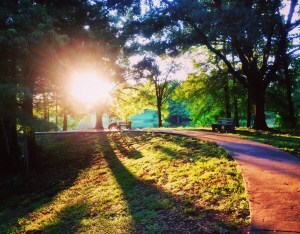
But as the days passed, the pain did too. It wasn’t fast. It was organically slow, in fact. But it happened. Joy came. Community grew and then thrived. Laughter took a seat at the front door, kicked off his shoes, and then asked for a refill. My job was great. My work meant something. And more than anything, the growth and change and evolution in my soul paired a sentiment to that house, in that town, with those people that I cherished and didn’t particularly want to leave.
It’s a natural thing, I think, to not want to let go of something good.
On the last night I lived in that house, my clothes were damp with sweat. My shirt stuck to my body and was stained brown with dirt, dust, and rust from moving stuff out of the house. No one was there that day. It was just me and the dog for a twelve-hour clean out.
I decided to take one last walk around the lake near the house. It’s so close to downtown you can see the city lights reflected on the water, but it’s far enough away you don’t hear the city. Just the songs of frogs and cicadas.
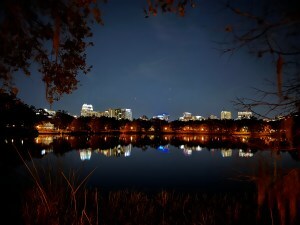
I remember fighting emotion, unsure of the wisdom of my choice to leave such a good situation – and one I’d fought hard to acquire. Tears started to roll down my face as I considered my immediate reality. I was leaving this beautiful, healing, community-filled, wonderful place for a complete unknown. And it was happening in real-time.
I started to pray out loud to the air, as I always did on the walks around that lake. I started to ask why I was doing this. Why now? What next? Was He sure? Was I sure? Why would I be asked to leave this beautiful, good, thriving place?
And through the rapid passing of questions through my mind one very clear, very calm sentence whispered into the violence.
“Child, do you think this is all I have for you?”
All the sudden my questions turned from why’s to wonder. What awaited beyond my letting go? What would I miss if I was unwilling to trust? What would I sacrifice if I was so focused on the good in front of me that I couldn’t see the great beyond the release?
I imagine it’s like climbing a mountain. The trail narrows and your legs burn, and your chest is heavy, and the trees crowd your sight. The walk has been lovely, the scenery – delicious, the views – delightful, and that’s enough. And so, you turn back for the bottom, thinking it’s all been just enough, when you were actually four, small steps from the thrill of the summit. You miss the clearing. You miss the view. You miss the victory, the celebration, the accomplishment, the satisfaction of knowing you did what you were meant to do.
I don’t want to miss the summit. The climb most of the way up does not feel like the story we were created to live.
I don’t have a miraculous conclusion. I made the move. I let go. I did the thing. Everything has changed, and yet not much has changed at all. I imagine if you hang around long enough, you’ll get the story along with me, as I live it, right here in this very blog.
The only thing I know for sure is that questions that start with the word ‘why’ offer nothing more than silence and shrugged shoulders. And even as I sit here tonight, met with fresh situational disappointment and persistent temptations to ask ‘why’, I must posit this newly ever-present inquiry: “Child, do you think this is all I have for you?”
It changes everything. So, from one fellow journeyer to another; one, weary, four-steps-away mountain climber; one doubting, questioning, complaining, are-we-there-yet-shouter to another: do you think this is all He has for you?
It’s a question only you can answer, but I’ll see you on the trail. I may be sweating, sitting on a rock looking ticked and eating dried mango, but I’ll be there.
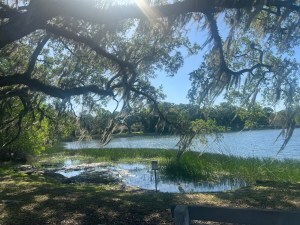
The post CHILD, DO YOU THINK THIS IS ALL I HAVE FOR YOU? first appeared on The website of N. Ford.



